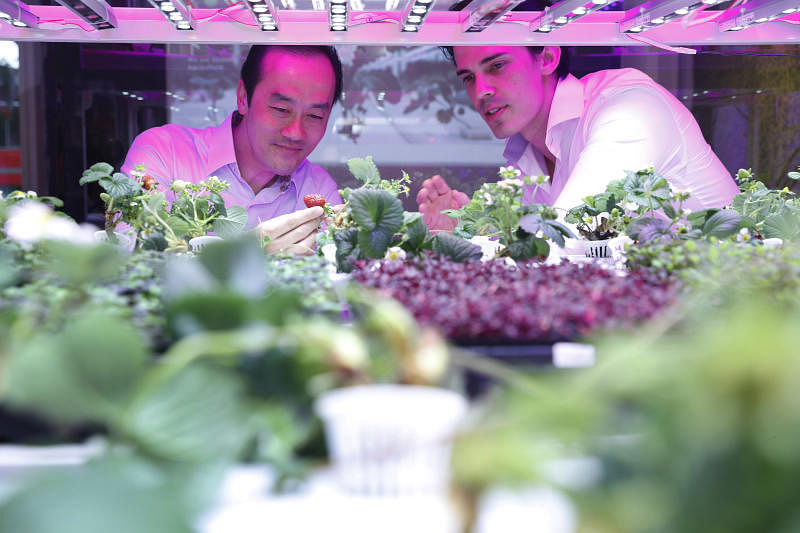Strawberries grown in Singapore vertical farm make debut
Sign up now: Get ST's newsletters delivered to your inbox

Senior Minister of State for Trade and Industry Koh Poh Koon (left) being briefed by Sustenir Agriculture co-founder Benjamin Swan on the Controlled Environment Agriculture farming method during the launch of Singapore's first locally grown strawberries.
ST PHOTO: YEN MENG JIIN
SINGAPORE - Strawberries grown in a vertical farm in Singapore - and available all year round - are being sold at selected supermarkets.
Senior Minister of State for Trade and Industry Koh Poh Koon, who took a look at Singapore's first commercially-grown local strawberries on Wednesday (June 20), said government agencies will need to see how best they can change rules to assist vertical farms here.
This means that agencies may need to be flexible, and liberalise regulations, to accommodate the needs of such firms here, he added.
Acknowledging the challenges that the vertical farm industry faces here, Dr Koh said that one solution was for commercial companies, universities and firms with research and development (R&D) expertise to work together with urban farmers. The Government will explore how clustering can be applied in this industry as well, like siting vertical farms with other businesses they can leverage for expertise, he added.
He accepted that finding spaces here for vertical farms was a challenge and said that the Government would see what more it could do to assist farmers who identify areas and buildings that they are keen to set up facilities in.
Dr Koh was speaking on the sidelines of a visit to the R&D laboratory of local vertical farming company, Sustenir Agriculture, at one-north.
Sustenir's researchers had successfully cultivated strawberry plants in the lab, and the fruit has since been grown in Sustenir's vertical farm.
The strawberries are being sold at selected Cold Storage outlets at $12 a punnet.
Most vertical farm companies, such as Sustenir, currently grow vegetables like kale and other salad vegetables for sale in the local market. The latest addition to this plate are home-grown strawberries.
Dr Koh said that the technology used to grow high-value crops like strawberries can also support Singapore's food security requirements in times of need.
"The idea is to develop the know-how and have the technology mature so that in a time of need, you can easily switch over to different plant types (to grow in vertical farms)," he said.
Figures from the Agri-Food and Veterinary Authority (AVA) show that there were 26 indoor vertical farms here as at the end of April. In 2016, there were just six such farms.
More players need to be willing to adopt such business models even as the Government reaches out to them, Dr Koh said.
As the urban farming landscape matures in Singapore, the Government will also seek to engage residents.
Citing the example of the new town of Tengah, which features "community farmways", Dr Koh said the Government is exploring how to incorporate more urban community farming into newer housing estates.
While AVA figures show that the number of commercial rooftop farms here remained at one as of end-April, with no new additions in the past two years, Dr Koh said the Government will continue to look at how rooftop spaces like those at multi-storey carparks can be adapted for producing edible food.
"As we explore this space, and as interest grows, we will be able to do something more concrete," he said.


